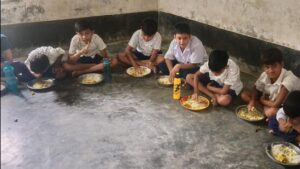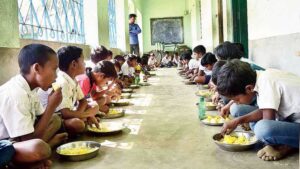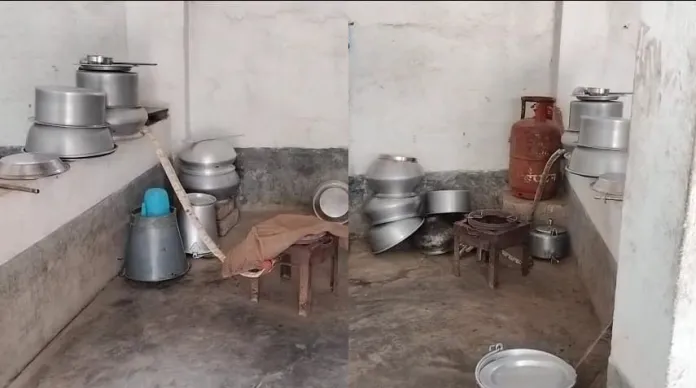By Qalam Times News Network
Purba Bardhaman, West Bengal – June 29:
In a significant development, the Kishoriganj Manmohanpur Primary School in West Bengal’s Purba Bardhaman district has officially ended the decades-old practice of serving mid-day meals separately to Hindu and Muslim students—a move welcomed by many as a step toward restoring communal harmony in public education.
The change came after the district administration launched an inquiry into longstanding reports that meals had been cooked in separate kitchens and served with different utensils according to students’ religious backgrounds—a viola
Mid-Day Meal Scheme.
District Magistrate Ayesha Rani confirmed that a fact-finding team was immediately dispatched once the matter came to the administration’s attention. “We have taken serious note of the issue. The inquiry is underway and suitable action will follow based on the findings,” she stated.
Following the district’s directive, Headmaster Tapan Ghosh convened a two-hour meeting involving teachers, guardians, local panchayat officials, and representatives from both the administration and law enforcement. “The children study and learn together under the same roof, but for years food was prepared and served separately. I have tried to address this since joining last year but faced resistance. Today’s meeting was held to collectively resolve this matter,” Ghosh said.
The practice reportedly began around the year 2000, shortly after the implementation of the Mid-Day Meal Scheme, with the school engaging two different cooks to prepare food for Hindu and Muslim students in separate utensils and kitchens. Meals were even served in different classrooms based on religious affiliation, despite being cooked using a single gas connection.

The school, located in Purbasthali I Block—approximately 150 kilometers from Kolkata—currently enrolls 72 students, comprising 29 Muslim and 43 Hindu children. With the recent administrative intervention, this practice has now officially been brought to an end. Going forward, meals will be prepared and served together, without any form of religious segregation.
To ensure smooth implementation, a local Self-Help Group (SHG) will soon take over the preparation of mid-day meals. Comprising village women, the SHG will adhere strictly to government-mandated food safety and nutritional norms. “All necessary guidelines will be followed to maintain equity and quality,” confirmed Mahbil Hussain Mondol, Deputy Pradhan of the local Gram Panchayat.
While the administrative stance remains firm against communal division in state-run schools, officials acknowledge that some parents still show reluctance toward this integration. Despite this, the administration remains committed to fostering inclusivity.
The Mid-Day Meal Scheme, introduced nationally in 1995 under then Prime Minister P.V. Narasimha Rao, was envisioned as a tool for enhancing both educational participation and nutritional outcomes among children, especially from marginalized communities. One of its key principles is to promote social integration by encouraging children of diverse religious and social backgrounds to share meals at school.
Renamed PM POSHAN (Pradhan Mantri Poshan Shakti Nirman) in 2021, the program remains one of the largest school feeding initiatives globally and continues to play a vital role in reducing classroom hunger, improving attendance, and cultivating a sense of unity among children.
Established in 1955, Kishoriganj Manmohanpur F.P. School is a government-run Bengali-medium co-educational institution offering classes from pre-primary to Grade IV. Despite its rural location and limited resources—including no boundary wall, playground, or computers—the school remains committed to providing basic education and mid-day meals under government provisions. It has three classrooms in good condition, functional toilets for boys and girls, a library with 116 books, and access to clean drinking water through hand pumps.
With this policy shift, the school now looks toward a future where unity is served—along with lunch—at the same table.
For more updates on education and social reforms, follow Qalam Times.







